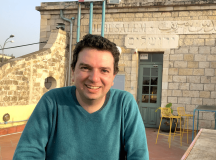Noga Emanuel reviews the history of Israeli songs which resonate in times of war. What causes certain songs to seize the public’s imagination at times of national anxiety and grief, Emanuel asks, comparing songs which rose to prominence during previous conflicts with the contemporary anthem, ‘Blessed God Always Loves Me’.
Sing, Goddess, Achilles’ rage,
Black and murderous, that cost the Greeks
Incalculable pain, pitched countless souls
Of heroes into Hades’ dark
Thus commenced Homer’s ‘Iliad’, launching his sprawling fantastical narration of the origins of the Greek nation.
In a nation’s imagination, the past acquires an epic status. Sherry Simon, quoting the Québécois critic Francois Hebert, once observed that ‘the nation is an epic, the city is a novel’. Little wonder, then, that the study of the Greeks always starts with a reading of the ‘Iliad’. The epic poem immortalises a mighty and mythical war, which might actually have never happened, or if it did, was a very small war about tariffs. What this example tells us is that wars are powerful national phenomena that get imprinted upon a nation’s psyche and identity.
As the storms of war gather, while they howl, and in their aftermath, songs are produced that can be sentimental, poignant, patriotic, morale building, and sombre. Some are written in response to situations created by the war. Some intend to bolster the confidence of the troops and of those who remain on the home front. Some war songs attempt to ease fears and longing, provide hope, and create a sense of unity in tumultuous times.
During WWII, British war songs were often nationalistic (‘There’ll Always Be An England’), evocative of wartime emotions, sadness and loss. The most popular vocalist of World War II, Vera Lynn, sang virtually every well-known wartime song, but her best known were ‘White Cliffs of Dover’and ‘We’ll Meet Again’. The themes of avowal to the homeland, the organic bond with its distinctive landscape, the pledge a soldier leaving for battle gives his sweetheart – these are universal and resonant, across cultures and languages. We will meet them in their Israeli lilt and melody a bit later.
Military-themed Hebrew songs were already circulating in the Yishuv (the Jewish population in Mandatory Palestine) before and during WWII. One development that stimulated this genre of popular artistic activity was the formation of the Jewish Infantry Brigade within the British army, recruited from among members of the Yishuv in late 1944, to help the British war effort. Among the most notable were songs like ‘Hora Nahalal’ and ‘Tzena, tzena’, whose lyrics encouraged mobilisation and expressed admiration for the valiant, and as yet not so common, sight of a Jewish soldier.
However, the local necessities for informal armed defence had already entered into the Yishuv’s collective consciousness even before the war in Europe. The Jewish autonomous force tasked with the defence of Jewish towns and villages against Arab attacks during the British Mandate had already become a familiar, though somewhat clandestine, feature of the Yishuv’s life since the foundation of the Haganah, the main Zionist paramilitary organisation, in 1920.
Within the Haganah, the Palmach platoons (the elite strike forces formed in 1941) were highly determined and robust volunteer defenders of Jewish villages and towns in pre-statehood Israel during the uncertain years 1941-48. The combination of informality and the clandestine nature of these forces (the future nucleus of the IDF) encouraged a certain ethos, an amalgamation of defiance, simple rural life-style, self-deprecating courage, wry bluster, and romance. The songs they wrote manifested these values and were sung around the bonfire in social evenings, during hikes and field trips – boosting morale and strengthening camaraderie, encouraging the spirit of volunteering and togetherness. The social evenings were usually improvised affairs, with young people gathering around the bonfire after a day’s work in the field or military training, brewing cups of black coffee, regaling each other with humorous tall tales (‘chizbat’), and of course singing.
The songs were also a matter of working with the available materials, so to speak. Hebrew lyrics were adapted to well-known, popular and traditional melodies – many from the Russian folkloristic playbook, but some from traditional British tunes. Songs gained fame through person-to-person transmission, passing from ear to mouth, eventually spreading into the public sphere.
With Israel becoming a bona fide state, enemies from within and without declared an all-out war on its very existence. The euphoria and ecstasy that seized the Yishuv following the Declaration of Independence soon changed to a mood of dread, anguish and defiance. New songs were written that echoed these emotions, which now came to resemble in focus and solemnity the British WWII songs mentioned earlier. The wry, brash tone we could sense in the Palmach’s songs was gone. The future of a nation was now hanging in the balance.
‘..the day will come…’ – The War of Independence, 1948
Certain songs that emerged during the 1948 war had such an impact on the public that they sometimes attained the status of anthem. They are remembered in the same way British war songs still are. To listen to these songs is to be transported in time to the scenes and voices and angst of the chaotic past.
One of the most iconic songs was that of the soldier who departs for war promising his sweetheart: ‘Ha’amini yom yavo‘ – believe, a day will come:
Then I will know
the battle makes sense
though the price be very high
that one day we can breathe here and live!
Believe, a day will come
It will be good, I vow
I will return to hold you
And tell you everything.
Looking at the collection of songs produced during the 1948 war, one gets the impression that, beyond the sadness, loss, defiance, and resolution, they were imbued with a deep conviction that this would be the last war – that once the storm was over, peace would prevail over the land. One such song was Haim Hefer’s best known lyric – a type of aspirational longing – ‘Hen Efshar’ (‘Can’t it be possible’).
The song was written during the first truce in the War of Independence. Hefer later said that the transition from the joy of the UN resolution on 29 November 1947, to the war and the many losses during it exhausted and demoralised the fighters both at the front and in the rear. Hefer testified that, in his opinion, it was the first peace song, which symbolised hope.
Surely it’s possible, surely it can be
that tomorrow is already here
Surely it may be that in the speeding jeep
The boys just roared it was all over
Surely it’s possible
that tomorrow is already here.
Another classic song by Hefer captured the complicated mood of the returning soldiers of sad resignation with the losses and the burgeoning hope that the terror of war was at an end: ‘The Last Battle’.
We will show up at your door, beloved
and lean our weapons against the wall,
Our fallen brothers, too, will stand there,
their faces ghostly white in the night.
As the wind outside howls,
and leaves drop from the lone tree,
in the roads heading south
one platoon will return from battle.
As the stars go out, we will emerge from the night
from the vast expanses of the ancient desert.
Smile, beloved, for we came back to you
From the last battle…
If I forget you, O Jerusalem of Gold – The Six Day War 1967
In May 1967, Egyptian president Gamal Abdel Nasser announced that the Straits of Tiran would be closed to Israeli vessels. Mobilising the Egyptian military along the border with Israel, he ordered the immediate withdrawal of all United Nations Emergency Force (UNEF) personnel. Israel’s army reserves were almost fully mobilised. The 19th anniversary of Israel’s Independence Day fell on 15 May, as the whole nation was holding its breath in suspended animation, the spectre of another devastating war again looming on all fronts.
Earlier that year, Jerusalem Mayor Teddy Kollek had asked Gil Aldema of Kol Yisrael (The Voice of Israel, Israel Broadcasting Authority) to write a song about the city. Aldema relayed the request to Naomi Shemer, Israel’s poet/lyricist laureate. For many years Kol Yisrael had held a song festival on the evening of Independence Day that was broadcast on the radio. On that particular occasion, the Broadcasting Authority deviated from the usual practice and showcased five songs from well-known composers outside the competition.
Shemer, who had difficulty writing the song, remembered the Talmudic legend about Rabbi Akiva promising his wife Rachel a ‘city of gold’ – a gold jewel in the form of Jerusalem. She called the song: ‘Jerusalem of Gold’. To perform the song, she chose singer Shuli Natan, a twenty-year-old soldier-teacher, who accompanied herself on the guitar. The song entranced the audience immediately. When the song contest ended and the winners were announced, Teddy Kollek asked for the song to be performed again. At midnight, Shuli Natan came on stage, and as she was singing, the audience sang the chorus with her:
Jerusalem of gold
And of copper, and of light
Behold I am a violin for all your songs.
Three weeks later, when the paratroopers liberated the Western Wall, they already had the song ‘Jerusalem of Gold’ on their lips. On 7 June 1967, the day Jerusalem came under Israel’s control, Shemer added a fourth verse, editing the original lyrics to fit the new realities:
We have returned to the cisterns
to the market and the public square
the horn blows out on the Temple Mount
In the Old City.
And over the caves in the rocks
a thousand suns are blazing –
and once again we descend to the Dead Sea
By way of Jericho!
It’s hard to refer to the song as ‘a hit’ since, on an elemental level, its appeal was powerfully spiritual for a nation threatened yet again by the thunderous rhetoric of annihilation from its enemies. Eventually, the song came to exemplify the historical juncture that was the Six Day War, and gained the status of a quasi-anthem.
Meir Ariel was one of the paratroopers who participated in the battles over Jerusalem. After the war, he composed different lyrics, emphasising the dark aspect of the war, as he, a fighting paratrooper, saw it.
In his own version of the song ‘Jerusalem of Iron’, he remembers and grieves over his fallen brothers in arms, the soldiers who were killed in the battle for the Temple Mount.
The strafed battalion troops charged ahead,
all covered in blood and smoke,
and mother followed mother,
to join the assembly of the bereaved.
Biting their lips, not without toil,
they fought on,
till, at long last the flag was raised
and flew over the house of the nation.
Jerusalem of iron,
of lead, of darkness,
haven’t we set your wall free?
Hashem Yitbarach / Blessed God Always Loves Me – Iron Swords, 2023
And Blessed God always loves me
And will always be good to me
Blessed God always love me
Things will be always good
And will be better
and better
Better and better
Better and better
Always get better
In the six decades between the Six Day War and the on-going ‘Iron Swords’ war, Israeli society has undergone deeply substantial evolution. From a population of 2.7 million it grew to nearly 10 million. Two major waves of immigration (Ethiopian, Russian) redrew Israel’s demographics. The percentage of religious to ultra-religious sectors multiplied. The relative volume of the pre-dominantly secular/traditional culture got smaller, and Mizrachi / Sephardic Jewish culture took on a greater role in the Israeli mainstream. It’s important to keep in mind these demographic developments before we go on to the next part of our discussion: the most heard and sung song of the current war. It’s a different kind of vibe, need, emotion, and appeal.
Behind the national hit, ‘Blessed God Always Loves Me’, is the Haredi singer Yair Elizur, and behind him is the rabbi who wrote the song, Rabbi Shalom Arush. The latter is a prominent name in Breslov Hasidism and the world of recantation. Elizur is considered a famous and respected rapper in the Haredi sector. He performs at night and studies Torah during the day. Sasson Ifram Shaulov’s successful performance helped the song become not only a hit, but also a real cultural phenomenon.
The song does not conform to any of our expectations of what a ‘war song’ is or should be. Critics there are a-plenty, but none that can actually point to a plausible and coherent explanation of why everyone, everywhere, is singing it; on vastly different occasions, but always within the context of the ‘Iron Swords’ war.
‘Blessed Always Loves Me’ started as an introspection written by Rabbi Shalom Arush four years ago, in the aftermath of the Mount Meron disaster: ‘Blessed God always loves me, and will always only be good for me,’ he jotted down, overwhelmed by the grief of the disaster. Elizur later took that short verbal suspiration and expanded it to describe how in moments of personal crisis and weakness, of joy and happiness, the speaker feels always enveloped by God’s affection, compassion, and support.
It’s beyond me to explain the soaring trajectory this song has assumed among Israelis. What I can do is provide a brief overview of the discourse and controversies this simple and guileless song stirred up in Israeli society.
Many Israelis may think that the lyrics of the song ‘Blessed God Always Loves Me’ are too far removed from reality, when the nation is still reeling and bleeding from the massacres of 7 October, and in the midst of a difficult war, with hostages being held captive in the dens of Gaza.
Other Israelis consider the theme of God’s providence too religious to be adopted by the still larger secular segments of society as a song for the times. Those vocally taking issue with the ostensible religiosity of the verses are fewer in number but make a big splash. Thus, a number of parents from several places in Israel complained that playing or singing the song ‘Always Loves Me’ in classrooms and kindergartens is an attempt to impress a messianic religious message on the children.
A teacher at a regional elementary state school played the song to her class. In response to the incident, the school principal wrote to parents:
Dear community, yesterday morning the children danced to the tune of a song with a religious overtone, which is currently being played on various radio stations. This was brought to our attention last night. We spoke with the teacher and explained to her that she must refine the content in accordance with the spirit of the school.
Ironically, the religious perspective supposedly reflected in the song has also sparked a hermeneutical (!) discussion among the great variety of religious communities. Some find it simplistic and problematic in its expectation – as they interpret the lyrics – that God will solve all your human pains and problems for you.
For other rabbis of a stricter Hassidic worldview, the song’s message is teetering on the cusp of apostasy. Is it possible, they wonder and worry, that religious and traditional society has moved from caring about what we humans are towards God, to challenging God about what He is towards us? How have we moved from ‘We love you, God’ to ‘God always loves me’? According to this view, the song reflects the cultural process that Israel’s secular and modern society nurtures: individualism and self-interest instead of spiritual and communal values.
Not so, comes the rejoinder from all those who were captivated, like most Israelis, by the message intended or implied in this song or hymn. Its authors are followers of Breslov Hassidism (whose spiritual founder, Rabbi Nachman of Breslov, left the unforgettable exhortation: ‘The whole entire world is a very narrow bridge and the main thing is to have no fear at all’) and their song is an attempt to deal with the classic Jewish dilemma: Why do the righteous suffer and the wicked thrive? The song offers hope, because it encourages good people to believe that justice will be done, and in the end things will get better.
And one music critic suggested that the song owes its immense popularity to no factor other than its very catchy, easy, rhythmic tune…
But no theory really explains why or what audiences of every segment in Israeli society choose to express when they sing and dance to its rhythm in a multitude of occasions. It even has a Yiddish version.
The wonderful Yuval Rafael, arriving home after her spectacular achievement in the Eurovision song contest, chants the refrain from the song, ‘Things will be always good /And will be better/and better’.
At the premiere of ‘Dancing with the stars’, just a couple of evenings ago, the outstanding dance of the evening went to pop star Shahar Tabuch and dancer Romi Nof, who performed a cha-cha to the tune of ‘Always Loves Me’. Shahar, a gay pop star and actor who is becoming closer to religion, wore a beautiful stylised top with ‘tzitzit’ fringes: ‘I asked for permission and approval from the Rabbi. May Blessed God always love us, and it will be good for us.’
We may remain sceptical about whether ‘Blessed God Always Loves Me’ is a projection of rebelliousness in the face of despair, a genuine outburst of religious faith, or just maudlin sentiment. But what clearly manifests is the widespread social and cultural reach of this song. Ashkenazi, Mizrahi, traditional, secular, and religious seem to respond with real feeling. Does it imply something about an evolving ethos within Israeli society? Are the tribes coming together, negotiating ways and fashions of mutual accommodation and interests? Is a collective identity being constituted, willy-nilly, right now in the midst of our gravest existential crisis since the foundation of the state?
‘Blessed God Always Loves Me’ is certainly not a classical war song, yet it does behave and has been received as such. As a war song, it is only natural that its impact will attenuate in time and be relegated to the attic of nostalgia. But the political, philosophical and social questions the phenomenon has helped bring to light will continue to perplex us for quite a while into the future. As will the answers.





































